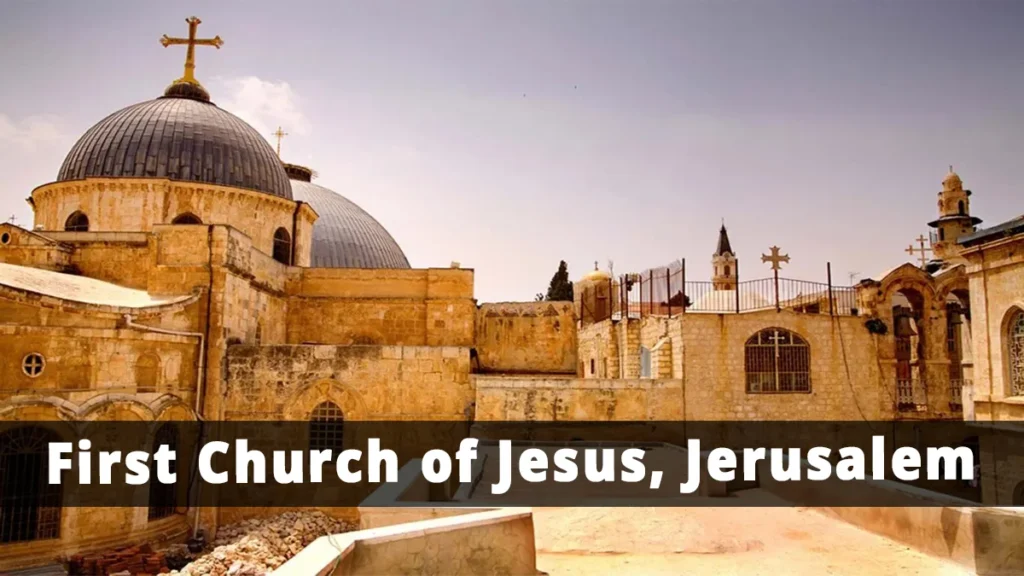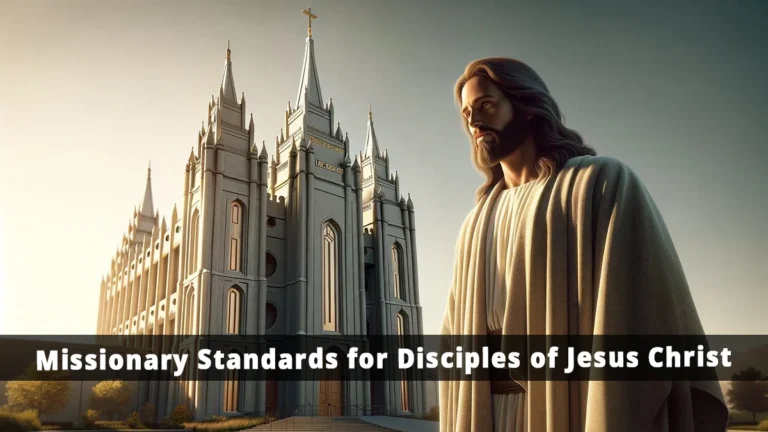Use Coupon FLAT10 for 10% OFF on Order over $100.
What Was the First Church of Jesus?
Explore the origins and impact of the first church of Jesus Christ in Jerusalem, a cornerstone of Christian history and theology.

The story of the first church of Jesus Christ is a fascinating and foundational aspect of Christian history. This church, born in the heart of Jerusalem, laid the groundwork for the global faith known as Christianity. Understanding the origins, practices, and impact of this early church provides profound insights into the development of one of the world’s major religions.
Historical Background
Origin of Christianity: Christianity emerged in the first century CE, rooted in the teachings of Jesus of Nazareth. Jesus’ message of love, repentance, and the Kingdom of God attracted a dedicated following, which would form the nucleus of the first Christian church.
Early Followers of Jesus: Jesus’ earliest followers were predominantly Jewish. These disciples believed Jesus to be the promised Messiah, fulfilling the prophecies of the Hebrew Scriptures. Their faith in his resurrection solidified their commitment, even in the face of persecution.
Historical Setting in Jerusalem: Jerusalem, a city of immense religious significance, was the epicentre of Jewish life and the backdrop for many key events in Jesus’ ministry. It was here that the early followers of Jesus gathered, marking the birthplace of the first Christian church.
The Role of the Apostles: The apostles, particularly Peter, James, and John, played crucial roles in establishing the early church. Their leadership, teachings, and missionary efforts were instrumental in spreading the message of Jesus beyond Jerusalem.
The Upper Room
Description of the Upper Room: The Upper Room, a significant location in Christian tradition, served as the meeting place for Jesus and his disciples during the Last Supper. This site is traditionally identified as the first Christian church.
The Last Supper: The Last Supper, held in the Upper Room, was a pivotal event where Jesus instituted the practice of communion. This meal symbolized the new covenant between God and humanity, a cornerstone of Christian worship.
The Pentecost Event: Pentecost, celebrated fifty days after Easter, commemorates the descent of the Holy Spirit upon the apostles in the Upper Room. This event empowered the apostles to preach boldly and marked the birth of the Christian church.
The First Church
Location and Establishment: The first church was established in Jerusalem, where the apostles and early believers gathered regularly. This nascent community was characterized by its devotion to the teachings of Jesus and communal living.
Significance of Jerusalem: Jerusalem’s significance as the first church’s location lies in its religious and historical importance. It was the city where Jesus was crucified and resurrected, making it a natural center for his followers.
Peter’s Role in the Early Church: Peter, one of Jesus’ closest disciples, emerged as a key leader in the early church. His sermons, particularly the one on Pentecost, were instrumental in converting many to the Christian faith.
Characteristics of the First Church: The first church in Jerusalem was marked by its simplicity, communal living, and dedication to prayer and teaching. The believers shared their possessions, ensuring that no one among them lacked anything.
Early Christian Practices
Worship and Prayer: Worship in the early church was centered around prayer, hymns, and the reading of Scripture. The believers met daily in the temple courts and in their homes to worship together.
Communion and Baptism: Communion, or the Lord’s Supper, was a regular practice, symbolizing the body and blood of Jesus. Baptism was performed as a rite of initiation into the Christian faith, signifying repentance and the washing away of sins.
Fellowship and Community Life: The early Christians emphasized fellowship, sharing meals, and living as a close-knit community. This sense of togetherness was crucial for mutual support and growth in faith.
Teaching and Doctrine: The apostles’ teachings formed the foundation of early Christian doctrine. Their teachings were based on the life and words of Jesus, as well as their understanding of the Hebrew Scriptures.
Expansion and Growth
Spread of Christianity: Christianity quickly spread beyond Jerusalem, reaching Judea, Samaria, and eventually the Roman Empire. This rapid expansion was facilitated by the missionary efforts of the apostles and other early Christians.
Missionary Journeys of the Apostles: The apostles embarked on numerous missionary journeys to spread the gospel. Paul, in particular, undertook extensive travels, establishing churches and converting Gentiles across the Mediterranean.
Role of Paul in Expansion: Paul’s role in the expansion of Christianity was pivotal. His letters to the early churches form a significant portion of the New Testament, providing theological insights and practical guidance.
Establishment of Other Early Churches: As Christianity spread, new churches were established in key cities such as Antioch, Corinth, and Rome. These churches played crucial roles in the growth and consolidation of the Christian faith.
Persecution and Challenges
Jewish Opposition: The early church faced significant opposition from Jewish religious leaders who viewed the new movement as a threat to their authority and traditions.
Roman Persecution: Roman authorities also persecuted Christians, particularly during the reigns of emperors like Nero. Christians were often scapegoated for various societal issues and faced severe punishments.
Internal Conflicts: Internal conflicts, such as disagreements over theological issues and leadership, also posed challenges to the early church. These conflicts, however, led to the development of more structured doctrines and church governance.
Martyrdom and Its Impact: The martyrdom of early Christians, including prominent figures like Stephen and James, had a profound impact on the church. Their willingness to die for their faith inspired others and strengthened the resolve of believers.
Organizational Structure
Leadership Roles: The early church developed a leadership structure that included apostles, elders, and deacons. These roles were essential for maintaining order and addressing the needs of the growing Christian community.
Role of Elders and Deacons: Elders were responsible for teaching and spiritual oversight, while deacons focused on serving the practical needs of the congregation. This division of labor ensured the effective functioning of the church.
Church Governance: Church governance in the early church was characterized by communal decision-making and mutual accountability. This collaborative approach helped to resolve conflicts and guide the church’s growth.
Decision Making Processes: Decisions in the early church were often made through prayer, discussion, and consensus. The Jerusalem Council, for example, was a significant gathering that addressed key theological issues and set precedents for future church practices.
Key Figures
Peter: Peter’s leadership and bold preaching were instrumental in the establishment and growth of the early church. His role as the “rock” upon which the church was built underscores his importance.
Paul: Paul’s missionary journeys and theological contributions significantly shaped early Christianity. His epistles provide a deep understanding of Christian doctrine and practical living.
James, the Brother of Jesus: James, known as the leader of the Jerusalem church, played a crucial role in bridging the gap between Jewish and Gentile Christians. His leadership and wisdom were vital in maintaining unity.
Stephen, the First Martyr: Stephen’s martyrdom marked a turning point for the early church. His courageous witness and eloquent defense of the faith inspired many and highlighted the cost of discipleship.
Archaeological Evidence
Findings in Jerusalem: Archaeological discoveries in Jerusalem, such as ancient synagogues and Christian artifacts, provide tangible evidence of the early church’s presence and activities.
Significance of the Church of the Holy Sepulchre: The Church of the Holy Sepulchre, believed to be the site of Jesus’ crucifixion and resurrection, is a significant archaeological and religious site. It stands as a testament to the early church’s historical roots.
Other Relevant Archaeological Sites: Other archaeological sites, including ancient Christian burial grounds and inscriptions, offer further insights into the lives and practices of early Christians.
Theological Importance
Role of the First Church in Christian Theology: The first church’s practices and teachings laid the foundation for Christian theology. The apostles’ teachings, particularly on the resurrection and the Holy Spirit, remain central to Christian belief.
Influence on Christian Doctrine: The doctrines developed by the early church, such as the Trinity and salvation by grace through faith, have profoundly influenced Christian theology throughout history.
Impact on Modern Christianity: The first church’s legacy continues to impact modern Christianity. Its emphasis on community, prayer, and teaching remains integral to Christian life and worship today.
Cultural and Social Impact
Influence on Jewish Society: The early church’s emergence within Jewish society led to significant cultural and religious shifts. While it faced opposition, it also attracted many Jews to the new faith.
Contribution to Greco-Roman World: Christianity’s spread into the Greco-Roman world brought new ethical and spiritual perspectives. The church’s teachings on love, justice, and the sanctity of life had a lasting impact on Western civilization.
Development of Christian Communities: The early church’s model of community life influenced the development of Christian communities throughout history. Monastic movements, communal living, and charitable work all trace their roots to these early practices.
Modern Relevance
Lessons from the First Church: The first church’s dedication to faith, community, and mission offers valuable lessons for contemporary Christians. Its example challenges believers to live out their faith authentically and boldly.
Influence on Contemporary Christian Practices: Many contemporary Christian practices, such as communion, baptism, and communal worship, have their origins in the early church. Understanding these roots enriches modern worship experiences.
Inspiration for Modern Christian Communities: The first church’s commitment to fellowship and mutual support continues to inspire modern Christian communities. It serves as a model for living out the gospel in a relational and communal way.
Frequently Asked Questions
What was the first church of Jesus?
The first church of Jesus was the early Christian community established in Jerusalem after his resurrection and ascension. It was led by the apostles and marked by communal living, worship, and teaching.
Where was the first church of Jesus located?
The first church of Jesus was located in Jerusalem, a city of great religious significance and the site of many key events in Jesus’ ministry.
Who were the key figures in the first church?
Key figures in the first church included the apostles Peter, James, and John, as well as Paul, who played a significant role in spreading Christianity beyond Jerusalem.
What were the main practices of the early church?
The main practices of the early church included worship and prayer, communion, baptism, fellowship, and teaching. These practices were foundational to the community’s spiritual life and growth.
Gifts by Jesus Final Thought
The first church of Jesus, established in Jerusalem, holds a central place in Christian history. Its origins, practices, and impact continue to influence contemporary Christianity. By understanding the early church’s dedication to faith, community, and mission, modern believers can draw inspiration and guidance for living out their faith in today’s world.



